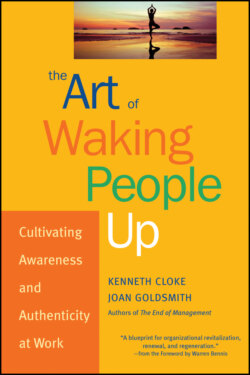Читать книгу The Art of Waking People Up - Kenneth Cloke - Страница 33
Cultivating Authenticity
ОглавлениеWhenever we do something that lacks integrity or consciously harms another person, we become counterfeit and unbalanced. Whenever we collapse our identity into a role, or allow our self-worth to be crushed by someone else’s negative opinion of who we are, or pretend to be someone we aren’t, we become divided and less congruent. Whenever we reduce our awareness, operate on autopilot, or anesthetize ourselves against “the slings and arrows of outrageous fortune,” we diminish our capacity to be authentic.
The joyful authenticity of children never fails to capture our attention or warm our hearts. Yet we rarely give ourselves the same opportunity to be joyful, impetuous, genuine, and playful at work. Instead, we retreat behind self-aggrandizing egos, dreary hierarchical responsibilities, scripted bureaucratic roles, and closely guarded communications. We will ourselves to ignore or suppress the parts of ourselves that are trying to be free. Unfortunately, the self that learns to survive in these conditions is a colorless being. We are like crabs who carry the shells we grow at work during the rest of our lives. How sad it is to realize how much of ourselves we set aside at work and how little we make available to others, or even to ourselves.
The difficulty is that, in the short term, living authentically requires greater energy and courage than retreating into dullness and insensitivity, particularly in organizations that place a premium on superficiality, posturing, and blind acquiescence. In rigidly hierarchical organizations, those who behave authentically risk being marginalized or losing their jobs. Inauthenticity is encouraged by the use of bureaucratic, superficial, tedious, worse-than-useless feedback systems that stimulate defensiveness and pretense, and are widely perceived as isolating, undermining, and threatening to self-confidence. Sadly, these workplaces are dangerous for those who want to learn from their mistakes. They actively reduce responsibility and discourage leadership. Yet it is clear from research and elementary logic that authenticity contributes directly to increased motivation, organizational capacity, and economic success.
We first become inauthentic by uncritically accepting other people’s judgments about who we are. We are reduced in families and schools to a series of labels. We are “unpopular,” “bad at math,” “unable to carry a tune,” “unable to handle stress,” or “poor at follow through.” These early examples of hierarchically imposed feedback reveal how easy it is to capitulate to someone else’s image of who we are out of self-protection, laziness, or lack of self-confidence. Yet the power of these judgments is not that we are told we are incapable of something, but that we believed it and stopped trying because we did not think we could succeed.
Yet negative assessments can be heard not as verdicts but as challenges that encourage us to prove them wrong. Thus every external version of who we are is false because it is merely some single person’s version—yet true because it reveals an internal disabling belief that, once shattered, can wake us up and make us more curious about who we actually are. Because each of us can get better at anything we choose to do, the way we respond to feedback reveals more about our self-confidence and skill in interpreting critical input than it does about our innate abilities. We can all learn, improve, and change every aspect of our lives. All we have to do is want to do so.
Moreover, a primary characteristic of leadership is authenticity. We are all drawn to authentic leaders. We admire them, count on them, and wonder what mysterious quality attracts us to them. Yet their secret is easy to discover: they are clear about who they are. They are in touch with their own inner truths. Leadership is ubiquitous. It exists at every organizational level through a myriad of roles and a wide variety of expressions and modes of operating. To become leaders in our own work lives, each of us needs to develop our capacity for authenticity. Only when we wake up ourselves, develop a clear sense of who we are, and act with integrity, can we begin to ask the same of others.
